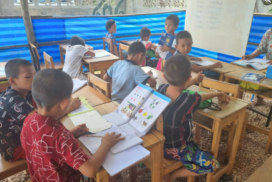SPEECH BY PROFESSOR STEFAN TALMON
SECOND PRELIMINARY OBJECTION
Madam President, Mr Vice-President, distinguished Members of the Court
1. My task today is to respond to The Gambia’s observations made in response to Myanmar’s second preliminary objection – The Gambia’s lack of standing in this case.
2. On Wednesday, you heard that Myanmar’s argument was “absurd”, “abject”, “ahistorical”, “erroneous”, “tenuous”, “concocted”, and “unfortunate”1 – what you did not hear was any positive argument that The Gambia has standing in these proceedings.
Distinction between invocation of responsibility and standing
3. Let me start by saying that The Gambia in its oral presentation – as in its written observations – constantly and consistently conflates or, better, mixes up the invocation of responsibility and the standing of a State in proceedings before this Court. For example, The Gambia speaks of “standing … to invoke the State responsibility of the perpetrator of genocidal violence [la qualité pour invoquer la responsabilité de l’Etat auteur des violences génocidaires].”2 Let me be clear: the invocation of responsibility and standing are two distinct concepts. The ILC expressly noted this in its commentary on the Articles on State Responsibility, which I quoted on Monday.3
4. Myanmar addresses the question of the invocation of responsibility only because The Gambia erroneously equates a right to invoke the responsibility of a State with standing before this Court and draws the conclusion that whenever there is a right to invoke the responsibility of a State there must automatically be standing. This simply is not the case.
Invocation of responsibility and the nationality of claims rule
5. But let me address The Gambia’s argument with regard to the invocation of responsibility.
6. First, contrary to The Gambia’s assertion; Myanmar has not “accepted that The Gambia could invoke its international responsibility” [admettait …que la Gambie pouvait invoquer sa responsabilité internationale] in the present case.4 No such admission was made and no such conclusion can be drawn from the Court’s finding in its Provisional Measures Order that “Myanmar accepts that … The Gambia has an interest in Myanmar’s compliance with [erga omnes partes] obligations [Le Myanmar admet que … la Gambie a un intérêt à ce qu’il s’acquitte de ces obligations [erga omnes partes].”5
7. Second, and more importantly, The Gambia cannot invoke Myanmar’s responsibility with regard to alleged acts of genocide committed against non-nationals outside their own territory because of the nationality of claims rule.
8. The Gambia cannot explain away Article 44, subparagraph (a), of the Articles on State Responsibility which provides:
“The responsibility of a State may not be invoked if … the claim is not brought in accordance with any applicable rule relating to the nationality of claims [La responsabilité de l’État ne peut pas être invoquée si … La demande n’est pas présentée conformément aux règles applicables en matière de nationalité des réclamations].”
9. The text of the provision is clear and unequivocal and so is the ILC’s commentary. There is no exception to the nationality of claims rule for certain treaties or certain types of obligations.
10. The Gambia seizes on the phrase “any applicable rule relating to the nationality of claims” [aux règles applicables en matière de nationalité des réclamations] and the statement in the commentary that the “rule of nationality of claims… is a general condition for the invocation of responsibility in cases where it is applicable [la règle de la nationalité des réclamations … est une condition générale de l’invocation de la responsabilité dans les cas où elle est applicable].”6 Let me first highlight that the ILC itself calls the nationality of claims rule “a general condition for the invocation of responsibility [une condition générale de l’invocation de la responsabilité]” – so the nationality of claims requirement is the rule, not the exception, in all cases in which it is applicable.
11. It is correct that the nationality of claims rule is not applicable in all cases of State responsibility, but it is applicable in all cases in which a State invokes the responsibility of another State for an injury caused by an internationally wrongful act of that State to a natural or legal person. Thus, the rule is clearly applicable to the present case. The Gambia invokes the responsibility of Myanmar not for its own injuries but for injuries allegedly caused to individuals in Myanmar’s northern Rakhine State.
12. So, what arguments has The Gambia put before you for its contention that in case of the Genocide Convention, the nationality of claims rule is not applicable. First, it argued that “nothing in the Convention suggests that it would be” [rien dans le texte de la convention ne donne à penser qu’elle le serait] applicable.7 But, one must ask: must there be an indication or even express provision in the Convention on the application of the nationality of claims rule? The Genocide Convention deals with primary obligations. The nationality of claims rule, in the context of State responsibility, is a secondary rule: it deals with the general conditions under international law for a State to be considered responsible. These secondary rules apply to a breach of all treaties, so there is no need to deal with these general conditions in each and every individual treaty. The Gambia has not provided any example of a treaty that expressly provides for such application – the reason is simple: there is none. The application of the nationality of claims rule does not depend on the treaty, but on whether injuries have been caused to individuals.
13. The Gambia, secondly, advances that the application of the nationality of claims rule in the case of the Genocide Convention “would be contrary to the object and purpose of the Convention [contraire à l’objet et au but de la convention]”.8 However, The Gambia does not explain why the application of a general, secondary rule would be contrary to the Convention’s object and purpose. First of all, The Gambia does not clarify the object and purpose of the Convention but simply states that genocide is contrary to “the spirit and purpose of the United Nations [l’esprit et aux fins des Nation Unies]” and that it “shocks the conscience of mankind” [bouleverse la conscience humaine].9 This says nothing about the object and purpose of the Convention and why a general, secondary rule of international law should not be applicable in the present case.
14. It is submitted that the object and purpose of the Convention were to “condemn and punish genocide as a ‘crime under international law’ [de condamner et de réprimer le génocide comme « un crime de droit des gens »] by establishing individual criminal responsibility for acts of genocide and to bring the perpetrators of such acts to justice.10 The Convention must be seen against the background of the Nuremberg and Tokyo war crimes trials and not against any inter-State claims before this Court. Myanmar’s argument is thus by no means “ahistorical”.11 The object and purpose of the Convention do not demand that any Contracting State can invoke the responsibility of every other Contracting State with regard to alleged acts of genocide committed against non-nationals outside their territory.
15. If the nationality of claims rule were, in fact, contrary to the object and purpose of the Convention, one may ask why reservations to Articles VIII and IX of the Convention should not also be contrary to the Convention’s object and purpose – they too prevent the Contracting States from bringing alleged acts of genocide before the Court.
16. The application of the nationality of claims rule to the invocation of responsibility in case of injury to individuals may – in the words of The Gambia – lead to “unfortunate” [malencontreuse] results,12 but The Gambia has not presented any convincing arguments why it should not be applicable in the present case.
17. The nationality of claims rule precludes The Gambia from invoking Myanmar’s responsibility with regard to alleged acts of genocide committed against persons who are not its nationals. Thus, even if the invocation of responsibility had any bearing on the question of standing – which it has not – this could not establish standing in the present case.
Common interest insufficient to establish standing
Madam President, Members of the Court
18. The Gambia asserts that in case of the Genocide Convention standing does not require an individual legal interest, but that a common interest in compliance with the Convention suffices.13
19. It is correct that the Court held in its Provisional Measures Order that all States Parties to the Genocide Convention had such an interest and, on that basis, found that “The Gambia has prima facie standing to submit to it the dispute with Myanmar [la Gambie a prima facie qualité pour lui soumettre le différend qui l’oppose au Myanmar]”.14 The Court reached this decision on the basis of its findings in Belgium v. Senegal which – as I have demonstrated on Monday – can be distinguished both on grounds of fact and the law.
20. I would also like to reiterate the Court’s own statement in paragraph 85 of the Provisional Measures Order that
“the decision given in the present proceedings in no way prejudges … any questions relating to the admissibility of the Application or to the merits themselves. It leaves unaffected the right of the [parties] to submit arguments and evidence in respect of those questions [la décision rendue en la présente procédure ne préjuge en rien … aucune question relative à la recevabilité de la requête ou au fond lui-même. Elle laisse intact le droit des [parties] de faire valoir leurs moyens et éléments de preuve à cet égard].”15
21. As The Gambia has noted, new argument has been submitted at this hearing on the question of admissibility which in Myanmar’s view shows that The Gambia lacks standing in the present case.
22. If I may add, this would not be the first case where the Court decided at the provisional measures stage on a prima facie basis that it had jurisdiction or a claim was admissible, only to hold later that it was without jurisdiction or that the claim was inadmissible.16 It is thus far-fetched to assert that by welcoming the Provisional Measures Order the UN General Assembly and the member States confirmed that they “do consider The Gambia’s standing to be established.”17
23. The Gambia tries to dismiss Myanmar’s argument based on paragraph 91 of the Court’s judgment in Barcelona Traction because the paragraph does not expressly mention the Genocide Convention.18
24. This paragraph, however, deals with the general question of standing in case of violations of obligations erga omnes partes taking such obligations under universal human rights instruments only as an example. The Court held that the erga omnes partes character of these obligations may have been established to protect a common interest but that these instruments
“do not confer on States the capacity to protect the victims of infringements of such rights irrespective of their nationality [ne reconnaissent pas qualité aux Etats pour protéger les victimes de violations de ces droits indépendamment de leur nationalité].”19
25.The question may thus be asked why the nationality of claims rule is applicable to obligations erga omnes partes in universal human rights instruments, but should not be applicable to the same such obligations under the Genocide Convention. The Gambia has offered no answer to this question.
26. In the Barcelona Traction case, the Court contrasted the situation under universal human rights instruments with the situation under the European Convention on Human Rights, another treaty established to protect the collective interest of all States Parties. The European Convention in its Article 33 expressly vests a right in all Contracting States to refer any alleged breach of the Convention to the European Court of Human Rights. This shows that, absent an express authorization of standing, the mere fact that a treaty is established to protect the common interest does not suffice to establish the standing of all Contracting States in any given case.
27. The Gambia also seeks to dismiss the Court’s finding in paragraph 185 of the Bosnian Genocide case that a claim with regard to non-nationals “could raise questions about the legal interest or standing of the Applicant [pourrait soulever certaines interrogations quant à l’intérêt juridique ou à la qualité pour agir du demandeur]”. For The Gambia this passage is irrelevant because the Court did not decide these questions. But this misses the point. The fact that the Court felt it necessary to raise the question shows that the finding of a common interest of the parties of the Genocide Convention does not settle the question of standing.
The Gambia’s novel definition of standing
Madam President, Members of the Court
28. Let me now turn to the Gambia’s novel definition of standing. While the Court has defined standing as “legal right or interest regarding the subject-matter [droit ou intérêt juridique au regard de l’objet de la demande]” of a party’s claim.20 The Gambia now offers you a new definition. Standing now supposedly requires “nothing more than the interest in respecting the rules at the heart of the dispute [rien d’autre que l’intérêt pour le respect des règles qui sont au cœur du différend]”.21
29. This new definition calls for several observations.
30. First, this is a purely results-driven definition. A new definition has been concocted only to prove that the requirements of the new definition are met in the present case.
31. Second, the case of the “SS Wimbledon” is a bad starting point for any new general definition of standing, as standing in that case, was based on Article 386, paragraph 1, of the Versailles Peace Treaty which provided that in the event of a violation of certain provisions of the Treaty, “any interested Power [toute Puissance intéressée]” could bring the case before the Permanent Court of International Justice.22 Article 386, like Article 33 of the European Convention on Human Rights, thus provided an exceptional authorization of standing.
32. Third, there is no support for this new definition in the jurisprudence of the Court. On the contrary, the Court uses the terms “standing [la qualité pour agir]” and “legal interest [l’intérêt juridique]” interchangeably as shown in the Bosnian Genocide case.23
Madam President, Members of the Court.
33. Let me conclude again with a general observation.
34. Listening to The Gambia’s conclusions on Wednesday, and its assertion that it has the standing to bring this case against Myanmar because any other finding would “seriously undermine the value of the Convention” reminded me of a line in the poem “The Impossible Fact” by German poet Christian Morgenstern: “For, he reasons pointedly / That which must not, cannot be.”
35. But this is not the method of reasoning to be applied by the Court. Myanmar, therefore, invites the Court to find, in accordance with the established law on the admissibility of claims, that The Gambia lacks standing in the present case, and that, accordingly, its application be dismissed as inadmissible.
36. I thank the Court for its kind attention.
37. Madam President, may I now ask you to call on Professor Kolb to present Myanmar’s third preliminary objection.














